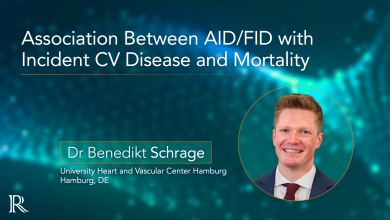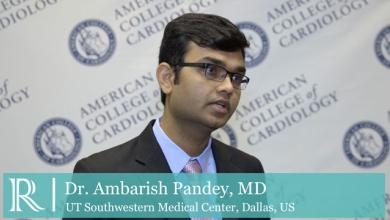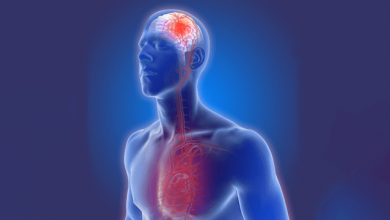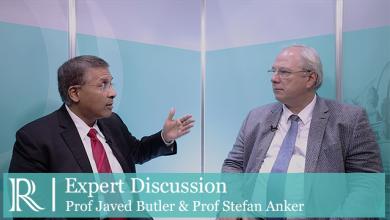Search results
Author(s):
Derek P Chew
,
Harvey D White
Added:
3 years ago
The cumulative evidence base informing almost every aspect of myocardial infarction acute coronary syndrome (ACS) care is expansive and has been associated with a decline in the rate of mortality. Within the context of current-era clinical trials of ST-segment-elevation myocardial infarction, 30-day mortality rates of 4–5% have now been reported for high-risk individuals,1,2 with similar rates…
View more
Author(s):
David Playford
Added:
3 years ago
Prof David Playford (The University of Notre Dame, Perth, AU) discusses diastolic function and mortality in 436,360 individuals using findings from the National Echo Database of Australia (NEDA).
Questions:
1. What are the objectives behind NEDA?
2. What findings did you present at ESC?
3. What were the methods of the study?
4. What were the study’s results?
5. What conclusions can be made?
6…
View more
Author(s):
Benedikt Schrage
Added:
2 years ago
In this short video, Dr Benedikt Schrage (University Heart and Vascular Center Hamburg, DE) summarises the main findings from the analysis that looked into the association between AID/FID with incident CV disease and mortality in 2 164 individuals from three European population-based cohorts. The study, published in the ESC Heart Failure (2021), found that attributable risks ofFID for the tested…
View more
Author(s):
Ambarish Pandey
Added:
6 years ago
Ambarish Pandey discusses the GWTG-HF Registry -30-Day Risk Standardized Mortality and Long-Term Survival After HF Hospitalization
Filmed by Radcliffe Cardiology on-site at theACC 2018 congress in Orlando, US
View more
Author(s):
Steven V Manoukian
,
Michele D Voeltz
,
Frederick Feit
Added:
3 years ago
Non-ST-segment elevation (NSTE) acute coronary syndromes (ACS) include unstable angina (UA) and NSTE myocardial infarction (NSTEMI), and account for one and a half million hospitalisations in the US annually. Patients with ACS are typically managed by initial medical stabilisation followed by an early invasive approach, whereby cardiac catheterisation is performed, usually within 24 hours of…
View more
Author(s):
Naoya Oketani
,
Koonlawee Nademanee
Added:
3 years ago
Atrial fibrillation (AF) is the most common cardiac arrhythmia, becomes more prevalent with age,1 and is associated with an increased long-term risk for stroke, heart failure, and all-cause mortality.2 AF can occur in the absence of underlying heart disease, but is more frequent in connection with mitral valve disease, heart failure, ischemic heart disease, and hypertension.3
Over the past…
View more
The Impact of Haemorrhagic Complications on Mortality in Acute Coronary Syndromes—Implications for…
Author(s):
Steven V Manoukian
,
Michele D Voeltz
,
Frederick Feit
Added:
3 years ago
Article
Author(s):
Nathan T Glusenkamp
,
William J Oetgen
,
Brendan Mullen
Added:
3 years ago
The past decade has seen impressive advances in cardiovascular (CV) care and reductions in patient mortality from CV disease (CVD). Between 1997 and 2007 (the year for which most recent final data are available), the death rate from CVD declined by 27.8 %. The actual number of CVD deaths per year declined by 14.2 % over this period. Meanwhile, the death rate for stroke fell by 44.8 % in the same…
View more
Author(s):
Javed Butler
,
Stefan Anker
Added:
5 years ago
Esc 2018: Use of sglt2 Inhibitors in Clinical Practice to Reduce CV Mortality in Patients With Type 2 Diabetes - Prof Javed Butler & Prof Stefan Anker
Filmed on-site at ESC 2018 by Radcliffe Cardiology.
View more
Author(s):
Paul S Chan
Added:
3 years ago
Sudden cardiac death (SCD) is the leading cause of mortality in patients with ischemic heart disease and left ventricular dysfunction.1 The second Multicenter Automatic Defibrillator Implantation Trial (MADIT-II) and the Sudden Cardiac Death in Heart Failure Trial (SCD-HeFT) have shown that implantable cardioverter defibrillators (ICDs) reduce mortality in patients with ischemic heart disease and…
View more














